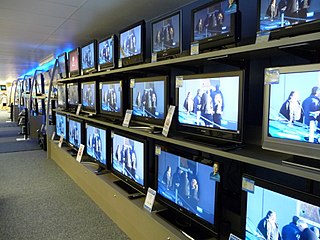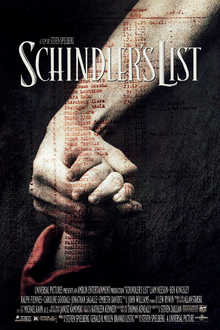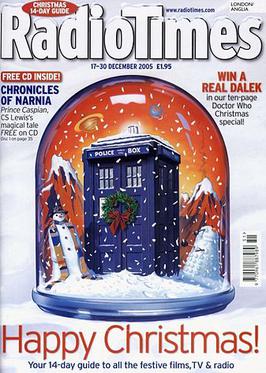
Dubbing is a post-production process used in filmmaking and video production, often in concert with sound design, in which additional or supplementary recordings (doubles) are lip-synced and "mixed" with original production sound to create the finished soundtrack.

Television (TV) is a telecommunication medium for transmitting moving images and sound. The term can refer to a television set, or the medium of television transmission. Television is a mass medium for advertising, entertainment, news, and sports.

Schindler's List is a 1993 American epic historical drama film directed and produced by Steven Spielberg and written by Steven Zaillian. It is based on the 1982 novel Schindler's Ark by Australian novelist Thomas Keneally. The film follows Oskar Schindler, a German industrialist who saved more than a thousand mostly Polish–Jewish refugees from the Holocaust by employing them in his factories during World War II. It stars Liam Neeson as Schindler, Ralph Fiennes as SS officer Amon Göth, and Ben Kingsley as Schindler's Jewish accountant Itzhak Stern.

The Office is the title of a number of mockumentary sitcoms based on a British series originally created by Ricky Gervais and Stephen Merchant as The Office in 2001. The original series also starred Gervais as the boss and main character of the show. The two seasons were broadcast on BBC Two in 2001 and 2002, totalling 12 episodes, with two special episodes in 2003, and an extra short spectacular ten years later. Versions of the original were subsequently made in Germany, the United States, and many other countries.

Teri Hatcher is an American actress and singer best known for her portrayals of Lois Lane on the television series Lois & Clark: The New Adventures of Superman (1993–1997), Paris Carver in the James Bond film Tomorrow Never Dies (1997), Mel Jones and the Beldam in Coraline (2009), and Susan Mayer on the television series Desperate Housewives (2004–2012), for which she won the Golden Globe Award for Best Actress in a Musical or Comedy and three Screen Actors Guild Awards, and was nominated for a Primetime Emmy Award for Outstanding Lead Actress in a Comedy Series.

Heidi Klum is a German-American model, television host, producer, and businesswoman. She appeared on the cover of the Sports Illustrated Swimsuit Issue in 1998 and was the first German model to become a Victoria's Secret Angel.

Deutsche Welle, commonly shortened to DW, is a German public, state-owned international broadcaster funded by the German federal tax budget. The service is available in 32 languages. DW's satellite television service consists of channels in English, German, Spanish, Persian, and Arabic. The work of DW is regulated by the Deutsche Welle Act, stating that content is intended to be independent of government influence. DW is a member of the European Broadcasting Union (EBU).

TV 2 is a Danish government-owned broadcast and subscription television station in Denmark based in Odense, Funen. The station was founded in 1986, and made its first official broadcast in 1988. It makes daily broadcasts of regional and national news, as well as its morning talk show, Go'morgen Danmark.

Radio Times is a British weekly listings magazine devoted to television and radio programme schedules, with other features such as interviews, film reviews and lifestyle items. Founded in May 1923 by John Reith, then general manager of the British Broadcasting Company, it was the world's first broadcast listings magazine.
RTL Group is a Luxembourg-based international media conglomerate, with another corporate centre in Cologne, North Rhine-Westphalia, Germany. The company operates 56 commercial and public television channels and 36 radio stations in Germany, France and other European countries. It also offers national streaming platforms, content productions and a range of digital services. Important segments of RTL Group are RTL Deutschland, Groupe M6 and Fremantle.
The Radio-télévision belge de la Communauté française, shortened to RTBF, is a public service broadcaster delivering radio and television services to the French-speaking Community of Belgium, in Wallonia and Brussels. Its counterpart in the Flemish Community is the Dutch-language VRT, and in the German-speaking Community it is BRF.

ARD is a joint organisation of Germany's regional public-service broadcasters. It was founded in 1950 in West Germany to represent the common interests of the new, decentralised, post-war broadcasting services – in particular the introduction of a joint television network.

The Bundesliga, sometimes referred to as the Fußball-Bundesliga or 1. Bundesliga, is a professional association football league in Germany. At the top of the German football league system, the Bundesliga is Germany's primary football competition. The Bundesliga comprises 18 teams and operates on a system of promotion and relegation with the 2. Bundesliga. Seasons run from August to May. Games are played on Fridays, Saturdays and Sundays. All of the Bundesliga clubs take part in the DFB-Pokal cup competition. The winner of the Bundesliga qualifies for the DFL-Supercup.
Popstars is an international reality television franchise aimed to find new singing talent. Serving as a precursor to the Idol franchise, Popstars first began in New Zealand in 1999 when producer Jonathan Dowling formed the girl group TrueBliss. Despite all shows in the Popstars franchise having been off air in recent years, it remains one of the most successful TV show formats of all time with the format being sold to more than 50 countries, and producing groups such as Girls Aloud that had success on the UK charts for the next ten years after winning. The show was the inspiration for Simon Fuller's Idols franchise.

KiKA is a German free-to-air television channel based in Erfurt, Germany. It is managed by a joint venture by public-service broadcasters ARD and ZDF. Its intended audience is children and the youth, and it is generally watched by children 3 to 13.

Luxembourg has participated in the Eurovision Song Contest 37 times since its debut at the first contest in 1956. The nation participated in all but one event between 1956 and 1993, only missing the 1959 contest. After finishing among the bottom seven countries in 1993, Luxembourg was relegated and prevented from competing in 1994. The nation did not return to the contest in 1995, and would make no further appearances over the next three decades. The country is set to return to the event for the first time in 31 years in 2024.

The concept of television is the work of many individuals in the late 19th and early 20th centuries. The first practical transmissions of moving images over a radio system used mechanical rotating perforated disks to scan a scene into a time-varying signal that could be reconstructed at a receiver back into an approximation of the original image. Development of television was interrupted by the Second World War. After the end of the war, all-electronic methods of scanning and displaying images became standard. Several different standards for addition of color to transmitted images were developed with different regions using technically incompatible signal standards. Television broadcasting expanded rapidly after World War II, becoming an important mass medium for advertising, propaganda, and entertainment.
This is a list of the most notable films produced in cinema of Germany.
Stingray Classica is a television channel devoted to classical music, opera, ballet and jazz, currently owned by Stingray Group in Canada.